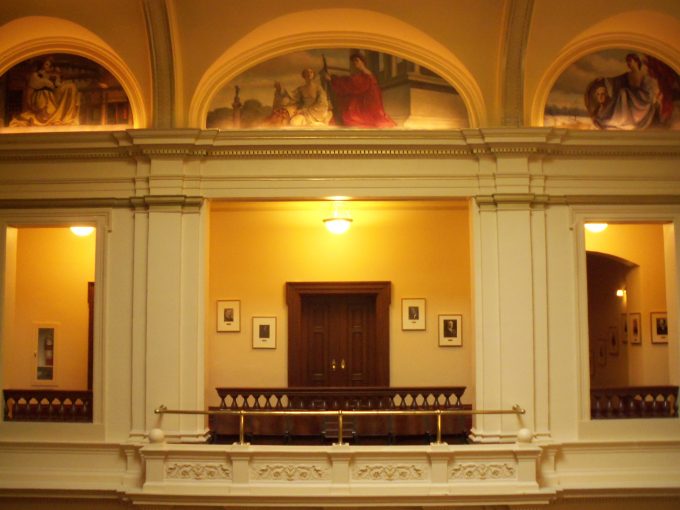
Friday, 3 May 2019
Now this, “Yet once more,” indicates the removal of those things that are being shaken, as of things that are made, that the things which cannot be shaken may remain. Hebrews 12:27
We now come to a verse which is highly debated over as to its meaning. The author says, “Now this, ‘Yet once more.’” That is speaking of what was just stated in the previous verse which said –
“Yet once more I shake not only the earth, but also heaven.”
The words “Yet once more,” signify “once more only.” There is a finality to what is being accomplished. When it is done, the results will be complete, final, and without need of further action.
Now explaining this, he says it “indicates the removal of those things that are being shaken.” The words “being shaken” are translated from a present participle and so it is obvious that this is on-going. It is not something that was simply accomplished and finalized at Christ’s first advent, but which takes us into a point in the future. From there, he explains exactly what he is referring to as meaning, “of things that are made.”
This is the clause that most commentators struggle with. Exactly what the author is referring to seems difficult to pin down, but he will explicitly say this in the next verse –
“…since we are receiving a kingdom which cannot be shaken.”
Therefore, it seems best to look at the words, “of things that are made,” as referring to anything that is not a part of this future kingdom, when it is brought to its final state. There are seven dispensations of time. In those dispensations, various things have occurred which are temporary in nature. For example, the dispensation of “government” allows the nations to govern themselves. This will be shaken out of the plan.
The dispensation of law required numerous things for Israel to do or not to do. These pointed to the work of the coming Christ, but were only intended as temporary pictures of what He would fulfill and then set aside. These will be shaken out of the Hebrew people when they put their full trust and hope in Christ. In essence, everything that is to be shaken out of the things that are made is already set to be shaken out by Christ’s first advent. However, they are actually not yet accomplished. This is akin to salvation. For those who have come to Christ, we are already saved, justified, sanctified, and glorified in God’s plans according to Paul’s words, and yet we are still here going through this fallen life in a fallen world. This idea corresponds to what the author is saying here in Hebrews.
All of this is done because of the work of Christ, but it is waiting to be realized so “that the things which cannot be shaken may remain.” When that which is accomplished by Christ is fully realized in what God has set based on Christ’s work, the only thing that will be left is that which is fully acceptable and pleasing to God. We can think of it this way –
“The work is accomplished and the plan is complete, but we are just waiting for time to catch up with that completion.”
One can look to Revelation 13:8 to more fully grasp this –
“All who dwell on the earth will worship him, whose names have not been written in the Book of Life of the Lamb slain from the foundation of the world.”
There, Christ is called, “the Lamb slain from the foundation of the world.” God’s plan was already accomplished before a single thing had been created, but that plan had to be worked out in the stream of time. Eventually, Christ came and was crucified. The effects of that act were realized in God’s mind from the beginning, and yet the full effects within the stream of time are yet ahead. How do we know this is correct? Because the book is written, and it details what the final glory which lies ahead will be like. Thank God that we have a sure hope because of Christ who makes all things new!
Life application: The author tells us that what is being shaken is that which has been created. This doesn’t mean there was something wrong with the creation, but fault resulted because of our actions. For example, a house may be made of wood; there is nothing wrong with the wood, but the way it’s used may be faulty. That which is created, then, can be applied to the building blocks we assemble. That can be through materials, such as for the house, or through teachings, such as faulty doctrine in a denomination. That which is faulty will be shaken “so that what cannot be shaken may remain.” As Jesus is eternal, not created, He cannot be shaken –
“You are from beneath; I am from above. You are of this world; I am not of this world. world.” John 8:23
And again –
“Jesus answered, ‘My kingdom is not of this world. If My kingdom were of this world, My servants would fight, so that I should not be delivered to the Jews; but now My kingdom is not from here.’” John 18:36
Following our faith in Jesus to its logical conclusion where proper faith, in Him, will never be shaken –
“For the Scripture says, ‘Whoever believes on Him will not be put to shame.’” Romans 10:11
Therefore, that which “cannot be shaken” includes our faith in the Rock of our salvation – faith in Jesus Christ. All other systems of religion, all other philosophies, all other attempts to stand righteous before God, all of these things will be shaken. By the very fact that they are faulty, they will be removed. Hold fast to your faith in Christ Jesus which is worth more than anything else in this fallen world, which is set to be shaken.
Lord God, You have brought us from total separation from You to complete harmony with You. And it has been accomplished – from beginning to end – by You. It is through Christ that the world has been reconciled to You. Soon, all that fails to measure up in this test of grace through faith will be removed. Help us to share this simple and yet all-important message while there is still time. And Lord God, thank You for Jesus Christ our Lord. Amen.




